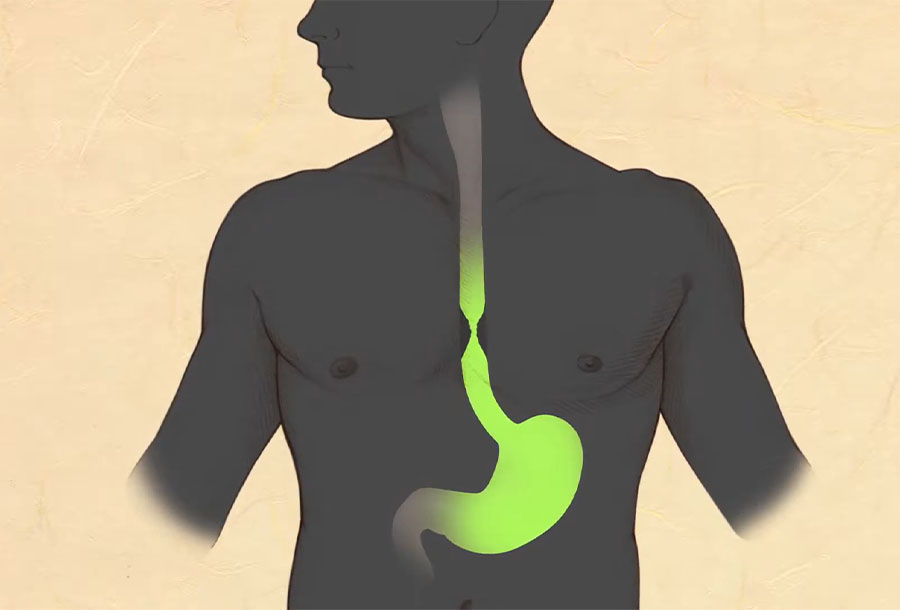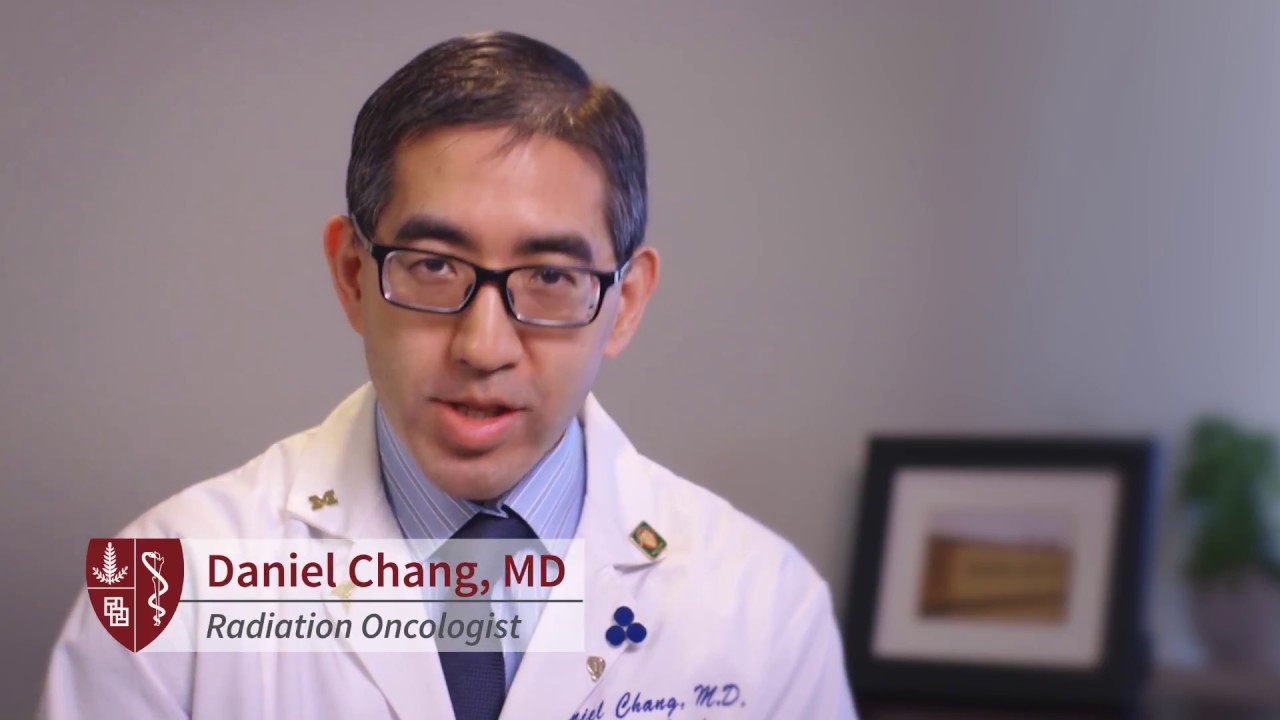Our renowned team leads the nation in esophageal cancer treatments. We are skilled at performing minimally invasive surgical procedures, including advanced robot-assisted techniques. Offering customized treatment plans and comprehensive support, we’re by your side every step of the way.
Overview
What is esophageal cancer?
Esophageal cancer develops in the inner layer of the esophagus, a hollow tube that starts in your throat and connects to your stomach. In adults, the esophagus is about 10 to 13 inches long. As part of your gastrointestinal (GI) tract, the esophagus carries food and liquids into your stomach.
Esophagus cancer can develop anywhere along the esophagus. At first, esophageal tumors form in the inner layer (mucosa) of the esophagus. As they grow, the tumors extend to the outermost layers.
How does esophageal cancer develop?
Esophageal cancer happens when abnormal cells grow and form tumors. The cancerous cells grow uncontrollably and crowd out healthy cells. Untreated, these tumors can grow beyond the outer layers of the esophagus, spreading to lymph nodes and other organs.
This type of cancer can result from irritation of the esophagus, and in some cases, it is associated with chronic (long-term) acid reflux, smoking, or drinking too much alcohol. Often, the first sign of esophageal cancer is trouble swallowing. This happens when an esophageal tumor narrows the esophagus, making it difficult for food to pass. Depending on the extent of the disease, treatments may focus on removing tumors, reducing symptoms, or improving quality of life.
Connect to Care
Let us help find personalized care options for you and your family.
Esophageal Cancer Symptoms
Signs of esophageal cancer include:
- Difficulty swallowing (dysphagia)
- Choking on or regurgitating food
- Heartburn and indigestion
- Hoarseness or chronic cough
- Pain, burning sensation, or pressure in the chest or upper abdomen
- Unexplained weight loss
- Blood in the stool, which can make stool look very dark or black
- Vomiting
Types of Esophageal Cancer
There are two main types of esophageal cancer. Your cancer care team will determine the specific type of cancer you have and recommend a treatment plan just for you. The two main types include:
- Adenocarcinoma: This type of cancer forms in the gland cells located in the lining of the esophagus. These gland cells make mucus that aids in digestion. Adenocarcinomas typically develop in the bottom third of the esophagus, where the esophagus and the stomach come together. This is the most common type of esophageal cancer in the United States.
- Squamous cell carcinoma: This type of cancer develops in the thin, flat squamous cells in the lining of the esophagus. While it can occur anywhere in the esophagus, it tends to grow more often in the upper and middle sections (in the neck and chest). This type is more common in certain Asian countries, such as China, Mongolia, and Iran.
Esophageal Cancer Stages
Doctors use a process called staging to determine if cancer has spread and, if so, how far. Staging helps doctors develop a treatment plan. Your care team uses a T, N, M system to stage esophageal cancer. This means they consider many factors, including:
- Tumor: Your doctor looks at how deep the cancer extends into the layers, lining, and wall of the esophagus.
- Nodes: Your doctor will check to see if cancer has spread to nearby lymph nodes.
- Metastasis: Your doctor will also check to see if cancer has spread (metastasized) to other organs or parts of the body farther away from the original tumor, such as the liver, lung, or bones.
During the staging process, doctors also consider the grade of the tumor. To determine a tumor’s grade, doctors examine the cancer cells under a microscope. They evaluate how the cells look compared to the cells of healthy tissue. If the cells appear abnormal, the cancer is more likely to be aggressive.
Cancer staging can be very complicated, and there are separate staging systems for the two main types of esophageal cancer. Your doctor will explain the staging process to you and help you understand the extent of the cancer you have.
Risk factors increase the chance of developing cancer and other conditions.
Your risk of esophageal cancer is higher if you have certain health conditions, including:
- Gastroesophageal reflux disease (GERD): Also called acid reflux, GERD irritates the lining of your esophagus. Over time, this irritation can lead to cancer.
- Barrett’s esophagus: This precancerous condition is a complication of GERD. Damage to the lining of the esophagus causes the cells to change.
- Achalasia: Achalasia is a swallowing disorder that results from problems with the muscles and nerves that move food through the digestive tract. These problems can lead to irritation in the esophagus.
- Tylosis: This rare genetic disorder causes mouth lesions and thickening of the skin on the palms and soles of the feet. People with tylosis should be monitored regularly for signs of esophageal cancer because their genetic differences give them an increased chance of developing the condition.
- Plummer-Vinson syndrome: A rare disorder, Plummer-Vinson syndrome causes esophageal webs (extra tissue) to grow in the esophagus. The webs make the esophagus narrow, causing difficulty swallowing. Over time, these swallowing problems can lead to cancer.
- Human papilloma virus (HPV) infection: This infection can result from more than 100 different viruses. On rare occasions, HPV can lead to esophageal cancer.
Other factors that affect your risk of esophageal cancer include:
- Age: People over 55 are much more likely to develop this condition. It rarely occurs in people under 45.
- Gender: Men have a higher chance of developing esophageal cancer.
- Excessive alcohol use: Drinking too much alcohol can irritate the lining of the esophagus over time.
- Smoking and tobacco use: Your risk of developing esophageal cancer increases with the number of cigarettes you smoke each day and the number of years you have smoked or used tobacco products. Quitting at any age lowers your risk of developing cancer.
- Exposure to radiation: Radiation therapy to the chest from childhood through early adulthood increases esophageal cancer risk later in life.
- Geography and lifestyle: Esophageal cancer is more common in some Asian countries, especially China. Doctors and researchers believe this is due to dietary habits and lifestyle choices, such as smoking cigarettes. People in these areas also tend to drink very hot liquids, which can lead to this type of cancer.
- Diet and nutrition: Eating a diet rich in fruits and vegetables lowers the risk of esophageal cancer and other cancers.
- Weight: Obesity increases your risk of certain digestive conditions, including acid reflux. Over time, acid reflux can irritate the lining of the esophagus and lead to cancer.
- History of exposure to chemicals: Children who accidentally drink lye, a chemical used in household cleaning supplies, have a higher risk of developing cancer of the esophagus. Lye damages the esophagus. After it heals, a stricture (narrowing) can develop, and inflammation from the stricture can lead to cancer.
- Family history: People with a family history of cancer, including mouth cancer and throat cancer, are more likely to develop this condition.
Your doctor begins by doing a comprehensive physical examination. They will also ask questions about your:
- Symptoms
- Medical history
- Family history of cancer and other conditions
- Risk factors and lifestyle habits, such as whether you smoke or drink alcohol
To diagnose esophageal cancer, your doctor may recommend specialized tests, such as:
Imaging tests provide detailed pictures of tissues and bones inside your body. Your doctor may order several imaging studies, such as:
- Barium swallow: You are given a thick liquid to swallow, then X-rays are performed. The liquid, called barium, coats the walls of the esophagus and helps the X-ray create clear images so your doctor can see the outline of your esophagus.
- Computed tomography scan (CT scan): This test uses special X-ray and computer equipment to create images of bones, tissues, and organs.
- Magnetic Resonance Imaging (MRI): An MRI uses powerful magnets, radio waves, and a computer to create pictures.
- Positron emission tomography (PET scan): A PET scan is a type of nuclear medicine imaging that measures cell activity in the body. You receive a small, safe amount of a tracer (a radioactive substance) that travels through your body. The tracer detects areas of increased cell activity, called hot spots. These hot spots show up brighter on the scan, which typically indicate cancerous cells.
- PET/CT scan: The PET/CT combination provides more accurate diagnoses than the two scans performed separately.
- Ultrasound: This test uses sound waves to create images of tissues in the body.
During an endoscopy procedure, your doctor inserts a flexible tube (endoscope) down your throat. The tube has a camera and tiny tools. Doctors use endoscopy to see inside your esophagus, check for signs of cancer in and around the esophagus, or take a tissue sample for a biopsy. Depending on several factors, your doctor may recommend:
- Upper endoscopy, a test that looks at your esophagus and stomach
- Endoscopic ultrasound, a test that uses an endoscope and ultrasound to determine the depth of the tumor and examine the lymph nodes around the esophagus
- Bronchoscopy, a test that examines your windpipe and lungs
- Laparoscopy, which examines tissues in the abdomen
A biopsy is a procedure doctors use to look for cancerous cells or determine the type of cancer. Your doctor removes a sample of esophageal tissue, either with a needle, endoscope, or during surgery. Your care team will recommend the most appropriate type of biopsy for you.
After removing the tissue samples, your doctor sends them to a lab for testing. The results of these tests help your care team develop the most appropriate treatment plan.
Your doctor may take small samples of your blood to test in a lab. Blood tests provide information about your health, including how your organs are working.
Esophageal Cancer
Our experienced team leads the nation in esophageal cancer treatments. We offer surgical and nonsurgical options and comprehensive support.
esophageal cancer
Barrett’s esophagus
esophageal cancer symptoms
GERD
acid reflux
achalasia
dysphagia
difficulty swallowing
esophagus cancer


